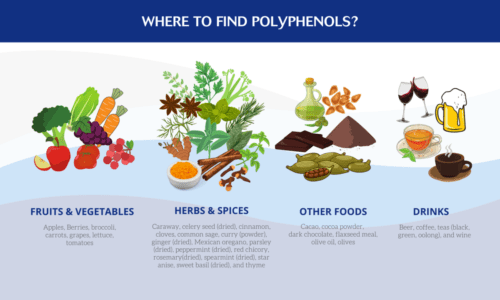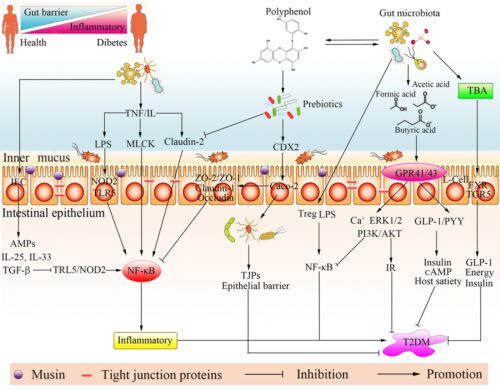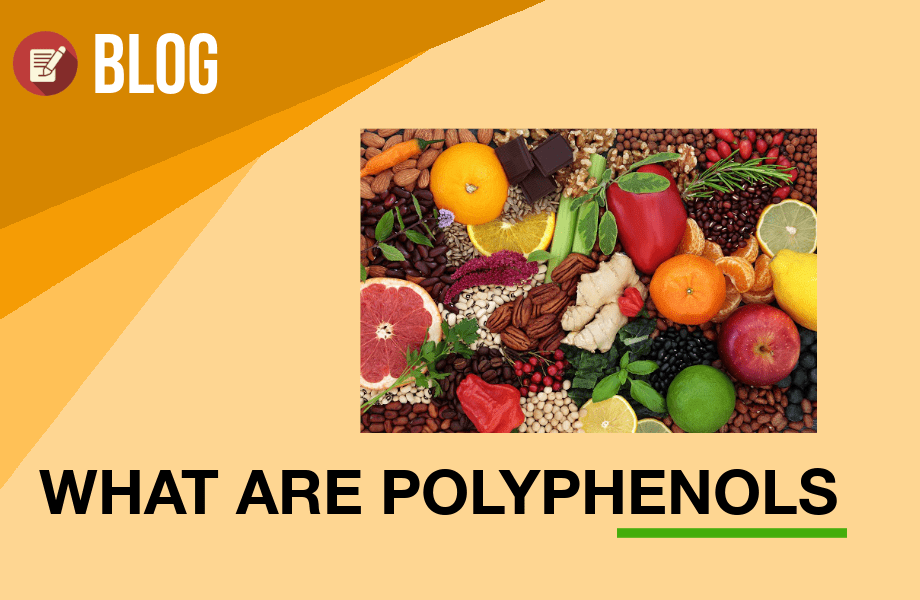What Is A Polyphenol? Benefits & How to Get Them
Polyphenols, the active compounds found abundantly in plant-based foods and beverages, have increasingly become the focus of scientific interest due to their potential health benefits. These include antioxidant properties, reduction of risk for chronic diseases (including type 2 diabetes), neuroprotective properties, and improvements in gut health.
These compounds are believed to play a pivotal role in human health, particularly in the prevention of non-communicable diseases like cardiovascular disease and type 2 diabetes.
We consume these phytonutrients through our diet, but should we look to supplement them? Do we have enough of them to maximize the benefits?
This article provides a comprehensive overview of polyphenols, their types, sources, health benefits, and more.
Table of Contents
Understanding Polyphenols
Polyphenols are organic compounds that are widely distributed in the plant kingdom. They are produced by plants and play a vital role in protecting the organism from external stimuli, including ultraviolet radiation and pathogen attacks.
Polyphenols have a diverse chemical structure, which allows them to serve a multitude of functions in plants and in human health when consumed as part of a balanced diet. They are known to exhibit antioxidant, anti-inflammatory, antihypertensive, and anti-diabetic properties, among others.
Types Polyphenols
Polyphenols are classified into several groups according to their diverse chemical structures.
The four primary families are flavonoids, lignans, stilbenes, and phenolic acids. Each family has unique chemical characteristics and is found in different types of foods.
- Flavonoids: They are present in a wide variety of fruits and vegetables, tea, chocolate and wine. Flavonoids include catechins, found in tea and cocoa, and quercetin, found in onions, apples, and tea.
- Lignans: Found primarily in seeds, grains, and vegetables. Flaxseeds are a particularly rich source.
- Stilbenes: This group includes resveratrol, a compound found in grapes and red wine, and pterostilbene, found in blueberries and grapes.
- Phenolic acids: These are found in a variety of foods, including coffee, blueberries, kiwis, plums, apples, and cherries.
Polyphenols in Food
Luckily, polyphenols are abundant in our daily diet. The most common sources include:
- Flavanols: Found in cocoa, tea, apples, and broad beans.
- Flavanones: Mostly found in citrus fruits.
- Flavonols: Present in tea, apples, and onions.
- Hydroxycinnamic acids: Abundant in coffee and various fruits and vegetables.
- Anthocyanins: Found in berries.
However, as you might have noticed, these compounds are mostly found in vegetables and greens, thus if your diet not rich on them, you will be missing on the benefits.
Thus, you might want to look to supplement with green powders or green smoothies.

Mechanisms of Action
Polyphenols exert their health benefits through several mechanisms of action. Their antioxidant properties play a crucial role in neutralizing harmful free radicals in the body, thus preventing oxidative stress, a key factor in the onset of many diseases.
Moreover, polyphenols can modulate the activity of a wide range of enzymes and cell receptors, which can result in a variety of health benefits, from improved cardiovascular health to reduced cancer risk.
Health Benefits of Polyphenols
Polyphenols have been associated with a range of health benefits. They are known to improve lipid profiles, lower blood pressure, enhance insulin resistance, and reduce systemic inflammation.
These compounds have also been linked to improved cardiovascular health and a decreased risk of various diseases such as myocardial infarction, stroke, and diabetes.
Additionally, polyphenols have shown potential in managing obesity and certain neurodegenerative diseases. For instance, certain polyphenols like catechins, resveratrol, and curcumin have been associated with anti-obesogenic effects, potentially aiding weight loss and maintenance.
Polyphenols and Chronic Disease Prevention
Role of Polyphenols in Non-Communicable Diseases
Non-communicable diseases (NCDs) such as cardiovascular diseases, cancers, respiratory diseases, and diabetes represent a significant global health burden. Polyphenols can play a significant role in preventing and managing these diseases.
For example, flavonoids and resveratrol have shown potential in blocking cholesterol oxidation, reducing LDL (bad cholesterol), and consequently lowering the risk of cardiovascular diseases.
Similarly, anthocyanins, a type of flavonoid, have been associated with both the prevention and management of type 2 diabetes.
Neurodegenerative Diseases
Emerging evidence suggests that polyphenols may also offer protection against neurodegenerative diseases like Alzheimer’s and Parkinson’s.
Certain polyphenols such as curcumin, resveratrol, and catechins may protect against neurotoxic effects and potentially slow the progression of these diseases.
A 2008 study showed that curcumin stimulates adult neurogenesis, and might facilitate the replacement of lost neurons. Thus, acting as key agents vs cognitive decline.
Fighting Obesity
Polyphenols like catechins, resveratrol, and curcumin have been linked to anti-obesogenic effects.
These compounds promote adipocyte oxidation, inhibit lipogenesis, reduce inflammation, and increase energy expenditure, leading to improved weight loss and maintenance.
Additionally, polyphenols have been found to inhibit starch, lipid, and protein digestion in the gastrointestinal tract.
Cardiovascular Health
Polyphenols, particularly flavanols found in cocoa and tea, have been extensively studied for their cardiovascular benefits.
Consumption of cocoa flavanols has been associated with improved endothelial function, lowered blood pressure, reduced LDL cholesterol oxidation, and inhibition of platelet aggregation.
Similarly, tea consumption, rich in catechins and gallocatechins, has been linked to lower blood pressure and improved lipid profiles.
Cancer Prevention
Flavonoids, including anthocyanins, catechins, flavanols, flavones, flavanones, and isoflavones, have been studied for their potential in cancer prevention.
These compounds have been shown to neutralize free radicals, inhibit cellular growth in tumors, and exhibit anti-inflammatory and antioxidant effects.
Specific types of cancers, such as colon, prostate, epithelial, endometrial, and breast cancer, have been identified as having beneficial effects from polyphenol consumption.
Type 2 Diabetes Management
Several polyphenolic compounds, such as anthocyanins, have been associated with the prevention and management of type 2 diabetes.
These compounds protect pancreatic beta cells, reduce inflammation, slow starch digestion, and regulate glucose transport and metabolism.
Studies have shown improved glycemic control, fasting glucose levels, and insulin sensitivity with the consumption of polyphenol-rich foods.

Interactions with Gut Microbiota
The interaction between polyphenols and the gut microbiota is a burgeoning field of research. Polyphenols are known to influence the gut microbiota composition, promoting the growth of beneficial bacteria while inhibiting harmful ones. The gut microbiota, in turn, metabolizes polyphenols into bioactive compounds that have therapeutic effects.
Supplements Versus Natural Sources
As discussed above, polyphenols can be easy to integrate in our diets.
The easiest way to add polyphenols to your diet is to include more berries and greens. Having green tea extract or coffee can also help.
However, if these are hard to get by or if you want to get a wider array of polyphenols for maximum health benefits you might want to look at green powders that include berries, kale, green tea extract etc.
Another good source for polyphenols could be plant-based meal replacement shakes that are made from whole foods. Examples of this include Lyfefuel Daily Essentials or Ka’chava with over 75 plant-based ingredients.
Conclusion
In summary, polyphenols, the powerful compounds found in plant-based foods and beverages, offer a wealth of potential health benefits.
From their antioxidant properties to their impact on chronic disease prevention, polyphenols have demonstrated their ability to positively influence human health.
While the exact mechanisms of action are still being explored, the evidence suggests that incorporating polyphenol-rich foods into our diets can contribute to improved cardiovascular health, neuroprotection, cancer prevention, type 2 diabetes management, and weight control.
In order to increase the polyphenol intake, you should increase your greens and vegetables intake.

